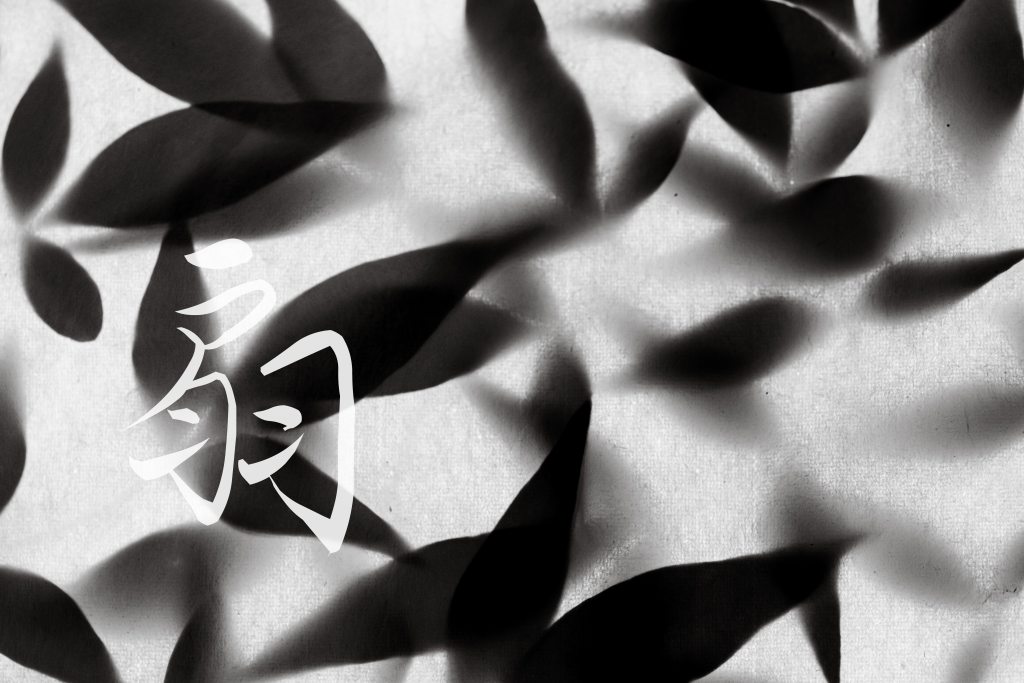
livre 1 section été / éventail
君が手にまかする秋の風なれば
なびかぬ草もあらじとぞ思ふ
きみがてに まかするあきのかぜなれば
なびかぬくさも あらじとぞおもふ
mot-à-mot
君が手に : toi, qui par ta main
まかする : confié / remis à ton gré
秋の風 : le vent d’automne
なれば : si (conditionnel)
なびかぬ : qui ne s’incline pas / ne fléchit pas
草 : herbe
も : même
あらじ : n’existera pas (forme négative forte)
とぞ思ふ : je le pense avec force (particle emphatique zo)
si c’est à toi, par ta main, à qui l’on a confié le vent d’automne,
je suis sûre qu’aucune herbe existe qui refuse de s’incliner
si c’est à ta main qu’est confié le vent d’automne
nulle herbe, c’est sûr, ne refusera de s’incliner
attribué à 中務 (なかつか Nakatsuka, dame de la cour, (912-991), Elle est une des cinq femmes figurant dans la liste des trente-six poètes immortels créée par fujiwara no kintô, l’auteur du wakan roeishu. elle est mariée à un autre poète de la liste : Minamoto no Saneakira (源信明).
Nakatsuka est par son père la petite-fille de l’empereur Uda et la fille de la poétesse dame Ise (également dans la liste des 36) dont elle compila le recueil de poèmes. Son père, Prince Atsuyoshi (敦慶親王, Atsuyoshi-shinnō) est responsable du Ministère central (nakatsukasa-kyō) et comme le nom de sa fille est inconnu, c’est l’intitulé de ce titre qui est utilisé pour la nommer.
elle eut une fille nommée Idono (井殿), qui devint l’épouse de Fujiwara no Koretada et mère de Fujiwara no Mitsuaki et qui meurt avant elle (un poème sur son deuil est célèbre :
わすられて
しばしまどろむ
ほどもがな
いつかはきみを
ゆめならで見ん
Oublier un instant
et sombrer dans un léger sommeil –
puisse-cela arriver !
quand te reverrai-je,
si ce n’est en rêve ?
Bien que ses activités en tant que dame de cour (nyōbō) ne soient pas clairement documentées, il est supposé qu’elle servit Fujiwara no Tadahira et son fils Fujiwara no Saneyori. meurt âgée !
Explication
Le poème s’adresse à un destinataire de rang élevé (kimi : l’empereur ? un amant ?)
il utilise la métaphore du vent d’automne et de l’herbe en référence directe aux Entretiens de Confucius (Analectes, XII, 19) :
君子の徳は風なり。小人の徳は草なり。草之に風を上ぐれば必ず偃ふ。
« La vertu du gentilhomme est comme le vent ; la vertu de l’homme de peu est comme l’herbe. Quand le vent souffle sur l’herbe, celle-ci ne peut manquer de ployer. »
Le texte chinois original :
子曰 君子之德風 小人之德草 草上之風必偃
il serait possible d’interpréter le poème comme un panégyrique politique glorifiant la vertu de l’empereur qui courbe tous les petits par sa vertu et sa volonté.
mais rien n’empêche aussi d’imaginer qu’il puisse s’agir d’un poème amoureux…
car dans un autre de ses poèmes, le vent d’automne (avec un jeu de mot sur aki : l’ennui) est utilisé pour faire un reproche à l’un de ses amants de ne plus venir la voir
秋風の
吹くにつけても
とはぬかな
荻の葉ならば
おとはしてまし
Le vent d’automne souffle,
Serais-tu lassé de moi ?
Tu ne donnes plus de nouvelles,
Mais si j’étais une feuille d’ogî,
Le vent m’aurait fait bruire, t’aurait attiré à moi.
English
Word-for-word
君が手に : you, who by your hand
まかする : entrusted / given over at will
秋の風 : the autumn wind
なれば : if (conditional)
なびかぬ : that does not bend / does not yield
草 : grass
も : even
あらじ : will not exist (strong negative)
とぞ思ふ : I think it with force (emphatic particle zo)
if it is to you, by your hand, to whom the autumn wind is entrusted,
I am sure that no grass exists that refuses to bow
if it is to your hand that the autumn wind is entrusted,
no grass, surely, will refuse to bend
Attributed to Nakatsuka (中務, Nakatsuka, court lady, 912–991). She is one of the five women included among the Thirty-Six Immortal Poets compiled by Fujiwara no Kintō, the author of the Wakan Rōeishū. She was married to another poet of the list, Minamoto no Saneakira (源信明).
Through her father she was the granddaughter of Emperor Uda and the daughter of the poetess Lady Ise (also in the list of 36), whose poetry collection she compiled. Her father, Prince Atsuyoshi (敦慶親王, Atsuyoshi-shinnō), held the office of Minister of the Central Affairs Bureau (nakatsukasa-kyō), and since her own name is unknown, she is referred to by this title.
She had a daughter named Idono (井殿), who became the wife of Fujiwara no Koretada and mother of Fujiwara no Mitsuaki, but died before her mother. A poem on her mourning is famous:
わすられて
しばしまどろむ
ほどもがな
いつかはきみを
ゆめならで見ん
To forget for a while,
and sink into a brief sleep—
if only it could be!
When shall I see you again,
if not in a dream?
Although her activities as a court lady (nyōbō) are not clearly documented, it is assumed she served Fujiwara no Tadahira and his son Fujiwara no Saneyori. She died at an old age.
Explanation
The poem is addressed to a high-ranking recipient (kimi: the emperor? a lover?).
It uses the metaphor of the autumn wind and the grass, in direct reference to the Analects of Confucius (XII, 19):
君子の徳は風なり。小人の徳は草なり。草之に風を上ぐれば必ず偃ふ。
“The virtue of the gentleman is like the wind; the virtue of the petty man is like the grass. When the wind blows upon the grass, it inevitably bends.”
Original Chinese text:
子曰 君子之德風 小人之德草 草上之風必偃
It can be interpreted as a political panegyric, glorifying the emperor’s virtue that bends all the lesser people by his virtue and will.
But nothing prevents us from also imagining it as a love poem…
For in another of her poems, the autumn wind (with a wordplay on aki: autumn / ennui) is used to reproach a lover who no longer comes to visit:
秋風の
吹くにつけても
とはぬかな
荻の葉ならば
おとはしてまし
The autumn wind blows,
are you weary of me?
You give no word,
but if I were a reed leaf,
the wind would make me rustle,
draw you back to me.
Japanese (日本語)
逐語訳(ことばごとに)
君が手に : あなたの手によって
まかする : 任せられ / 与えられた
秋の風 : 秋の風
なれば : もし〜ならば
なびかぬ : なびかない / 曲がらない
草 : 草
も : さえ
あらじ : あるはずがない(強い否定)
とぞ思ふ : 強くそう思う(強調の「ぞ」)
もし秋の風があなたの手に任されたものならば、
なびかない草など存在しないと強く思います。
もし秋の風があなたの手に託されたのならば、
なびかない草は必ず存在しないでしょう。
中務(なかつか、912–991) に帰せられる。藤原公任(ふじわらのきんとう)が編纂した『和漢朗詠集』の作者であり、三十六歌仙に数えられた五人の女性の一人。夫は同じ三十六歌仙の源信明。
父方では宇多天皇の孫、母は三十六歌仙に数えられる伊勢(女流歌人)で、その歌集を編纂した。父・敦慶親王(あつよししんのう、中務卿)は中務省の長官で、彼女の本名は伝わらないため、この官職名に由来する呼称で呼ばれる。
娘・井殿(いどの)は藤原伊尹の妻となり、藤原満明の母となったが、母より先に没した。その死を悼む和歌は有名である:
わすられて
しばしまどろむ
ほどもがな
いつかはきみを
ゆめならで見ん
少しの間でも忘れて
まどろむことができたら——
そうであればよいのに。
いつあなたに会えるのか、
夢でなくて会える日はあるのだろうか。
彼女の女房としての宮廷活動は明確ではないが、藤原忠平やその子・藤原実頼に仕えたと考えられている。長命を保ち、晩年まで生きた。
解説
この歌は高貴な相手(君:天皇か、あるいは恋人か)に向けられている。
秋風と草の比喩は『論語』(顔淵第十二・十九)に直接基づいている:
君子の徳は風なり。小人の徳は草なり。草之に風を上ぐれば必ず偃ふ。
「君子の徳は風のようであり、小人の徳は草のようである。草の上に風が吹けば必ず伏す。」
原文:中国語:
子曰 君子之德風 小人之德草 草上之風必偃
この歌は皇帝の徳を讃える政治的賛歌と解釈できる。
しかし同時に、恋の歌としても想像できる。
彼女の別の和歌では、秋風(秋=飽きという掛詞)が、通ってこなくなった恋人への恨みとして用いられる:
秋風の
吹くにつけても
とはぬかな
荻の葉ならば
おとはしてまし
秋風が吹くたびに、
なぜ訪ねてこないのか。
音沙汰もない。
もし私が荻の葉なら、
風が音を立てて
あなたを呼び寄せただろうに。
Mandarin (中文)
逐词翻译
君が手に : 在你手里 / 由你之手
まかする : 托付 / 交给
秋の風 : 秋风
なれば : 如果
なびかぬ : 不屈服 / 不弯曲
草 : 草
も : 也 / 连
あらじ : 不会存在(强烈否定)
とぞ思ふ : 我坚定地这样想(强调语气的「ぞ」)
如果秋风托付在你的手里,
我确信没有草会拒绝低伏。
如果秋风交托在你的手中,
毫无疑问,没有草会不低头。
归属于 中务(なかつか,912–991)。她是藤原公任编选的《和汉朗咏集》中三十六歌仙之一,也是仅有的五位女性之一。其夫为同样入选的源信明。
她的父亲是敦庆亲王(中务卿),祖父是宇多天皇,母亲是著名女诗人伊势(同列三十六歌仙),并由中务整理母亲的歌集。因其本名不详,遂以父官职「中务卿」称之。
她育有一女,名井殿,嫁藤原伊尹,生下藤原满明,但早逝。中务为其哀悼的和歌广为流传:
わすられて
しばしまどろむ
ほどもがな
いつかはきみを
ゆめならで見ん
暂时遗忘,
沉入片刻的浅眠——
若能如此,便是幸事。
何时能再见你?
若不是在梦里,又在何处?
她的宫廷活动未有明确记录,推测曾侍奉藤原忠平及其子藤原实赖。寿终高龄。
说明
此诗的对象是高位之人(「君」:或为天皇,或为恋人)。
它以秋风与草为喻,直接引用《论语·颜渊第十二·十九》:
君子之德风,小人之德草。草上之风必偃。
「君子的德行如风,小人的德行如草。风吹草上,草必低伏。」
可以解读为对天皇德行的颂扬:帝王之德如秋风,令万民(草)皆屈服。
但也完全可以视为情诗:
在她的另一首诗中,秋风(「秋」兼有「厌倦」之义)被用来责怪情人不再来访:
秋风吹,
难道你已厌我?
再无音讯。
若我是一片荻叶,
风声必已响起,
将你唤回我身边。

Vous devez être connecté pour poster un commentaire.